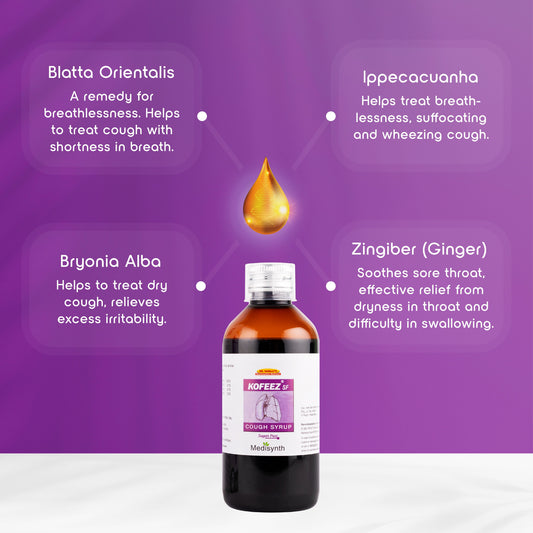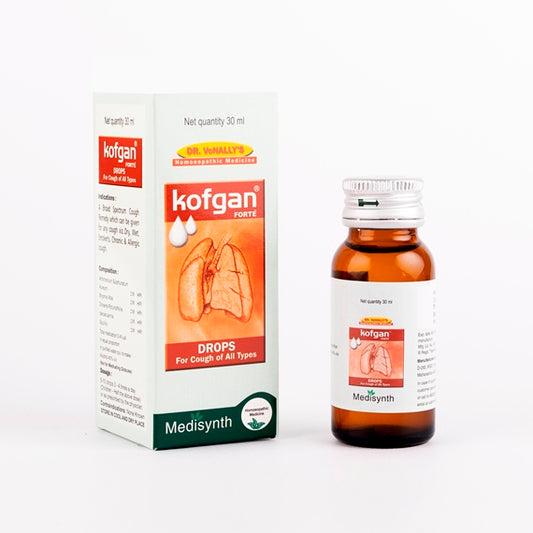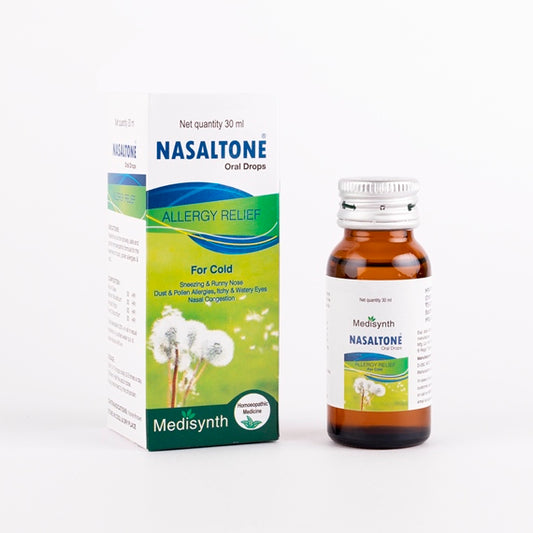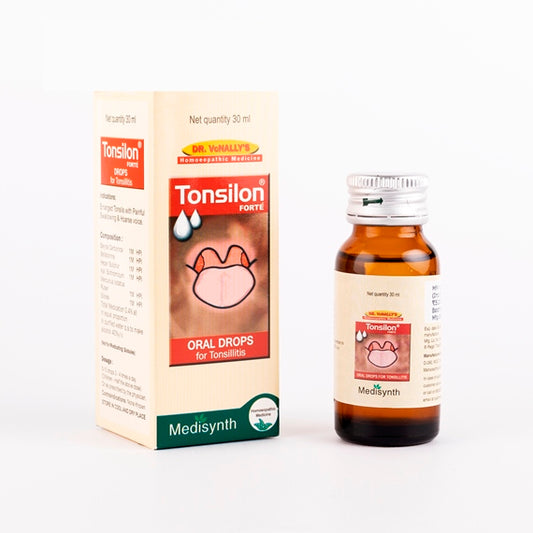How to Treat Cough at Home: The Best Home Remedies You Can Try

Cough is something almost everyone experiences at some point in life. While often harmless, it can be irritating, exhausting, and even disruptive when it lingers.
For many, the first instinct is to reach for over-the-counter syrups, but nature and holistic medicine provide effective alternatives that not only soothe but also strengthen the body’s healing response.
From simple kitchen remedies to homoeopathy medicine for cough, there are several safe and effective ways to find relief.
What Is a Cough?
A cough is the body’s natural reflex to clear the airways of irritants, mucus, or foreign particles.
It works as a defence mechanism, protecting the lungs and throat from infections and blockages. Coughs can be classified into different types:
-
Dry Cough: Also known as a non-productive cough, it produces no mucus and often causes throat irritation.
-
Wet or Productive Cough: This type brings up phlegm or mucus and is common with infections such as colds and bronchitis.
-
Acute Cough: Typically lasts less than three weeks and is usually linked to temporary infections.
-
Chronic Cough: Persists for more than eight weeks and may indicate an underlying condition such as asthma or acid reflux.
Understanding the type of cough is important because the treatment approach, whether through home remedies for coughing or homoeopathy, differs accordingly.
Best Home Remedies for Cough Treatment
Long before modern medicines were invented, we have relied on natural remedies for coughing. These remedies not only provide symptom relief but also strengthen immunity, soothe the throat, and restore balance to the respiratory system.
1. Honey
Honey is one of the most powerful natural remedies for cough. Its smooth texture coats the throat, easing irritation, while its antimicrobial properties fight infections. Several studies suggest that honey is as effective as common cough syrups in reducing nighttime coughing.
-
How to use: Take one teaspoon of raw honey before bed for nighttime relief. For children above one year of age, a spoonful of honey mixed in warm water works as a safe cough suppressant.
-
Best for: Dry cough, sore throat, and mild upper respiratory infections.
2. Ginger
Ginger is both a culinary spice and a medicinal herb. Its natural anti-inflammatory compounds relax the airways, while its warming effect calms throat irritation. Ginger is especially beneficial for remedies for dry cough, where persistent throat tickling triggers frequent bouts.
-
How to use: Fresh ginger tea prepared with slices of ginger boiled in water can be sipped several times a day. Raw ginger with honey is also a soothing option.
-
Best for: Dry, spasmodic coughs and coughs triggered by cold weather.
3. Steam Inhalation
Warm, moist air helps loosen mucus, reduce congestion, and ease breathing difficulties. Steam inhalation also hydrates irritated airways, providing quick relief.
-
How to use: Add a few drops of eucalyptus oil or peppermint oil to a bowl of hot water. Cover the head with a towel and inhale the steam for 5–10 minutes.
-
Best for: Productive cough with mucus, sinus congestion, and bronchitis.
4. Saltwater Gargle
A traditional remedy that works remarkably well, saltwater gargling reduces inflammation, kills bacteria, and soothes throat discomfort.
-
How to use: Dissolve half a teaspoon of salt in a glass of warm water and gargle twice daily.
-
Best for: Dry throat, sore throat, and mild bacterial irritation.
5. Warm Fluids
Hydration plays a critical role in recovery. Warm fluids keep the throat moist, thin mucus, and make it easier to cough up phlegm.
Herbal teas, chicken soup, and plain warm water are all effective.
-
Best for: Both dry and wet coughs, particularly when dehydration worsens irritation.
By using these remedies for coughing consistently, most people experience considerable relief within a few days.
However, if you want to address deeper causes then homeopathy medicine for cough as well as remedies can provide long-term solutions.
Homoeopathic Medicine for Cough
Homoeopathy views cough not just as a symptom but as the body’s way of signaling an imbalance.
Instead of suppressing the cough, homeopathic medicine for cough aims to address the underlying cause and support the body’s natural healing process.
The best homoeopathy medicines for cough are selected according to the nature, timing, and triggers of the cough.
1. Blatta Orientalis
Blatta Orientalis is one of the most effective remedies for individuals suffering from cough associated with dyspnoea and chronic bronchitis.
It is especially useful when the cough worsens during damp weather or after physical exertion. Patients often report significant relief in breathing difficulty and chest congestion with regular use.
2. Bryonia Alba
Bryonia Alba is a classic homeopathy remedy for dry, painful coughs. It is suited for situations where the cough becomes worse with even the slightest movement and improves when the person remains still.
Individuals who need this remedy often experience a deep, hacking cough that feels exhausting and is accompanied by chest pain.
3. Ipecacuanha
Ipecacuanha is recommended for spasmodic, persistent coughs, often accompanied by nausea and vomiting.
It is particularly useful in cases where there is difficulty bringing up phlegm, leading to a rattling sound in the chest. This remedy also benefits children who develop sudden, violent coughing fits.
4. Zingiber
Zingiber, or ginger in its natural form, is another valuable homeopathic and natural remedy. It helps soothe irritation in the throat, reduces inflammation, and improves overall respiratory function.
Ginger is versatile and can be taken raw, as tea, or incorporated into daily meals for ongoing respiratory support.
By addressing both the physical symptoms and the constitutional state of the individual, these remedies are regarded as some of the best homeopathy medicines for cough.
Best Homoeopathy Medicine for Cough
While we have mentioned the best home remedies for cough treatment along with the best homoeopathic remedies for cough, we know that a persistent cough can significantly affect the quality of life which is why taking a homoeopathic medicine might sometimes be necessary for some people.
Now, taking homoeopathic remedies individually might not be possible for you and this is one of the main reasons why people take over-the-counter medicines for cough which suppress the condition rather than healing it.
Kofeez and Kofeez SF Cough Syrup
That is why we can recommend the Kofeez Cough Syrup from Medisynth which comes with a sugar-free version as well for people who are on a diet or have insulin resistance.
Kofeez Cough Syrup, along with its sugar-free version, are made from all the natural homeopathic remedies mentioned above that work on all types of cough and give you relief.
Kofeez and Kofeez SF Cough Syrup are crafted to provide quick and effective relief from cold and cough symptoms.
Whether it’s congestion, throat irritation, or breathlessness, Kofeez Cough Syrup is here to help soothe and support your respiratory health naturally.
Apart from having a sugar-free option, Kofeez Cough Syrup also has the following benefits:
-
Non-drowsy
-
Helps to treat all types of cough (productive, dry & smoker’s cough)
-
Relieves congestion
-
Helps to treat bronchitis
-
Relieves breathlessness
How to Avoid Catching a Cough
Prevention is always better than cure, and the same holds true for cough. There are some people who have the tendency to catch coughs and colds more often than others. The reason being they fail to follow the basic precautions that are mentioned below.
While remedies for coughing and homoeopathy medicines provide effective relief, taking precautions reduces the likelihood of falling sick in the first place.
By strengthening the immune system and avoiding common triggers, it is possible to minimize the risk of developing cough.
1. Strengthen Immunity
A strong immune system acts as the first line of defence. Eat a balanced diet rich in vitamin C, vitamin D, and zinc to help the body fight off infections.
Regular exercise, adequate sleep, and stress management also play a major role in boosting immunity.
2. Maintain Good Hygiene
Cough is often spread through respiratory droplets. Simple hygiene measures can prevent infection:
-
Wash hands frequently with soap and water, especially after coming from the gym or office.
-
Use a tissue or elbow to cover the mouth and nose when coughing or sneezing.
-
Avoid sharing utensils, bottles, or towels with someone who is sick.
3. Stay Hydrated and Keep Airways Moist
Dry air irritates the respiratory tract and makes one more prone to cough. Drinking plenty of water and using a humidifier in dry climates helps keep the throat and airways moist, reducing vulnerability.
4. Avoid Common Irritants
Exposure to cigarette smoke, dust, strong perfumes, and pollution often triggers cough. Limiting contact with these irritants and wearing a mask in polluted environments protects the lungs.
5. Seasonal Care
Cough is more common during seasonal changes, especially winter and monsoon. Wearing appropriate clothing, staying warm, and consuming immunity-boosting foods such as ginger, garlic, and turmeric help the body adapt to weather fluctuations.
6. Manage Allergies and Chronic Conditions
For individuals prone to allergies or conditions like asthma, managing triggers is essential.
Use prescribed inhalers, stay away from allergens such as pollen or pet dander, and follow medical advice to prevent cough episodes.
By adopting these preventive strategies, the chances of catching a cough are significantly reduced.
Conclusion
Cough is the body’s way of protecting the respiratory system, but when persistent, it can significantly affect quality of life.
Simple home remedies for coughing such as honey, ginger, steam, gargles, and warm fluids provide effective relief and are safe for regular use.
At the same time, homoeopathy medicine for cough offers deeper, long-lasting benefits by addressing the root cause.
Whether it is for dry cough or productive cough, always combine natural methods with homeopathy to ensure not only symptom relief but also better respiratory health in the long run.
Also, make sure that you follow all the basic precautions mentioned above so as to not catch a cough or cold too often.
References:
-
Boerick’s Materia Medica with Repertory






